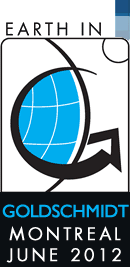Features
Dates & Deadlines
April 20
Early-bird registration deadline
June 1
Hotel reservations
June 11
Online Registration closes
The call for abstracts is now closed.
Themes
Sessions & Descriptions
| < Previous Theme | Theme Overview | Next Theme > |
Theme 19
Geochemical Kinetics
George Luther, Delaware,
Andrew Putnis, Münster,
SESSIONS
19a. Kinetics of microbial and geochemical processes
(co-hosted by Themes 19 & 16)
Co-convenors:
Martial Taillefert (Georgia Institute of Technology) - mtaillef![]() eas.gatech.edu
eas.gatech.edu
George Luther (University of Delaware) - luther![]() udel.edu
udel.edu
Microbiological processes play a significant role in the transformation of elements on Earth, yet the mechanisms of transformation of elements by microbial processes remain poorly understood partially because rate laws are not fully developed for the corresponding abiotic reactions. Kinetic studies are essential to characterize the mechanism of microbial transformation of elements and develop rate laws that could be used in predictive models, including reactive transport models and global circulation models. Simultaneously, mathematical models that describe the transformation of elements via biomolecular processes, either as predictive or diagnostic tools, are needed to account for the role of microbes in the biogeochemical cycling of elements.
This session welcomes papers that use kinetic studies, including experimental and theoretical investigations, on abiotic reactions and/or the corresponding reactions mediated with pure cultures, enrichments, or complex environmental samples in order to characterize microbial processes or their role in the geochemical transformation of elements. Aqueous, gaseous or solid phase topics of interest include, but are not limited to: aerobic and anaerobic microbial respiration processes, microbial oxidation processes (e.g., C, N, S, Fe, Mn), microbial transformation of inorganic and organic contaminants, carbon and nitrogen fixation, biological uptake of essential elements, geochemical processes indirectly affected by microbial metabolites or microbial processes
Keynote speaker:
Qusheng Jin (University of Oregon), qjin![]() uoregon.edu
uoregon.edu
19b. Linking experimental and field observations of mineral carbonatation for in-situ long-term carbon storage
(co-hosted by Themes 19 and 21)
Co-convenors:
Pablo Garcia Del Real (Stanford University) - gdelreal![]() stanford.edu
stanford.edu
Natalie Johnson (Stanford University) - nataliej![]() stanford.edu
stanford.edu
Mineral carbonation is the safest, most permanent subsurface storage mechanism of CO2, but the technology for implementation lags behind that of other CO2 storage methods. Studies combining laboratory experiments, geochemical modeling, and/or study of natural analogues are needed to advance the field towards implementation. This session invites contributions that focus on the experimental aspects of mineral carbonation of silicates, characterization of mineral carbonation field sites, and the bridge between the two: geochemical/reactive transport modeling. We aim to reconcile differences in fundamental parameters such as reactivity, physical characteristics (e.g. permeability, surface area), rates, and reaction extent between experimental and natural mineral carbonation. By bringing together knowledge gained from experimental, theoretical, and field-based research, we can constrain the carbonation mechanisms and timescales required for long-term storage of CO2 in the subsurface.
Keynote speaker:
Pete McGrail (Pacific Northwest National Laboratory),
19c. Kinetics of interfacial geochemical processes
Co-convenors:
Encarni Ruiz Agudo (University of Granada, Spain) - encaruiz![]() ugr.es
ugr.es
Rolf S. Arvidson (Rice University) - rsa4046![]() rice.edu
rice.edu
Reactions occurring at mineral-water interfaces are central to most geochemical processes, and affect contaminant fate, the composition of natural waters, weathering and soil formation, nutrient availability, biogeochemical element cycling, biomineralization, acid mine drainage, and nuclear waste disposal. Global rates of these processes are ultimately controlled by the kinetics of the reactions occurring at mineral surfaces. Observations as well as kinetic measurements of processes occurring at mineral interfaces give valuable evidence for mineral reaction mechanisms, either confirming existing models or showing the limitations of these theories, which can then be modified in the light of experimental evidence. Contributions reporting recent experimental and computational studies aimed at characterizing the mechanisms and quantifying the kinetics of dynamic interfacial processes such as dissolution, growth or adsorption, using state-of-the-art spectroscopic and microscopic techniques are encouraged.
Co-hosted sessions:
Please note that for abstract submission purposes, the following sessions and their respective descriptions appear in their primary Theme assignments (numbers in red or before the title).
- 7a- The Art of weathering: A symposium in Honor of Art White
- Co-convenors: Marjorie S. Schulz/USGS and Heather Buss/USGS
(co-hosted by Themes 7 and 19). - 7h- Weathering of sediments – from natural processes to underground CO2 storage
- Co-convenors: Matthias Haeckel/GEOMAR, Judith Schicks/GFZ, Potsdam and Giovanni Aloisi/UPMC, Paris
(co-hosted by Themes 7, 12 and 19) - 8a.-Mineral growth and dissolution: modern approaches to molecular-level reaction mechanism determination with implications for toxic metal sequestration, biomineralization, and engineering.
- Co-convenors: Andrew Stack/Oak Ridge, Steve Higgins/Wright State and Frank Heberling/Karlsruhe Institute of Technology
(co-hosted by Themes 8, 18 and 19) - 8j. Pore scale geochemical processes
- Co-convenors: Simon Emmanuel/Hebrew University and Carl Steefel/LBL
(co-hosted by Themes 8 and 19) - 18b.- Nucleation, growth, and dissolution in aqueous environments: elementary processes and atomistic models
- Co-convenors: Paolo Raiteri/CurtinU, Raffaella Demichelis/CurtinU and Sebastien Kerisit (PNNL)
(co-hosted by Themes 18 and 19) - 23c.-Nucleation and its effects on geological processes
- Co-convenors: David M. Hirsch/Western Washington University and Stephanie J. Moore/UT-Austin)
(co-hosted by Themes 23 and 19)




